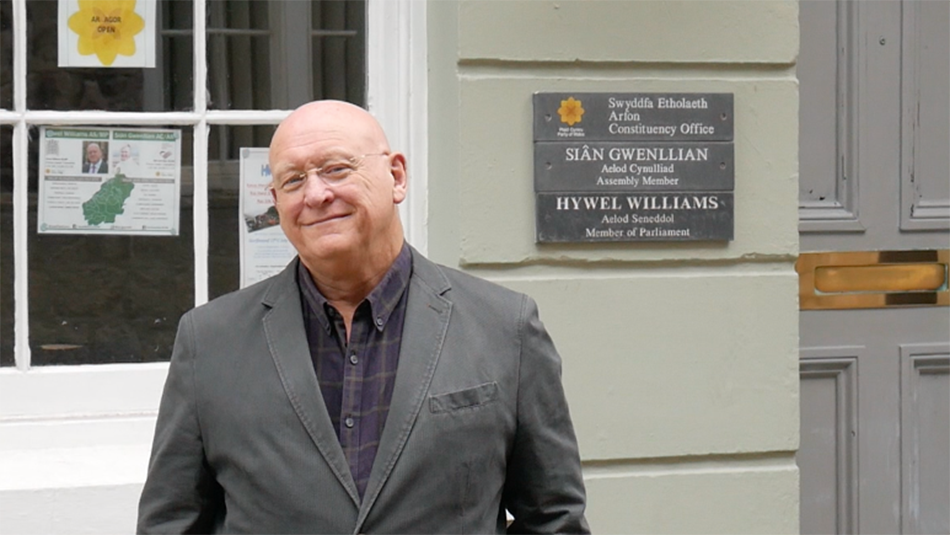As thousands miss out on winter benefits, Christian S. Phelps speaks to local advocates quietly fighting for a fix.
He’s sitting in a fluorescent-lit room, charming, mild-mannered, and opinionated—in some ways a stereotype of a politician, but perhaps more a stereotype of a Welshman.
He insists he could be running the government better than those who are, if they’d only let him.
On at least one issue, he may be right. Hywel Williams MP, of North Wales’s Arfon constituency, has identified a serious problem affecting his constituents when the weather gets cold.
“People who are vulnerable, high up in the hills, it’s really cold, they could do with some money, but their temperature’s not measured. It’s measured somewhere else,” he says. “They measure it down in Mona, which is on the seashore on the Isle of Anglesey.”

The flaw Mr Williams and others have found comes from a one-size-fits-all temperature measurement system in which homes within a number of nearby postcodes are measured together by a single Met Office station. In his region, this lumps mountainous homes in with coastal ones, even when temperatures and their effects are much different.
When people miss out on a Cold Weather Credit payment—an automatic £25 instalment for benefits recipients each week that the weather is particularly cold—the effects are easy to predict. Those in difficult physical and financial positions are more likely to go malnourished, lonely, cold, and sick, and excess winter mortality rises.
That’s where benefits and charities are meant to step in.
When people know about this issue, they often jump in holding safety nets taut. But questions remain about the strength of the safety nets themselves.
Arwel Jones manages the Arfon Foodbank, giving food parcels to a number of eligible North Wales residents twice a week, year-round. He enjoys this work, but speaks about the ways his foodbank stretches to accommodate the many issues facing local people in poverty.
From 2016 to 2018, Mr Jones says, the foodbank saw a 10 per cent increase in patrons. “We’re now also seeing the Universal Credit spike, so we foresee that going up again.”

The effort to get elderly, disabled, impoverished, and otherwise disadvantaged people through the winter can seem almost like a lost cause. Mr Williams has campaigned to change the way in which the government calculates Cold Weather Credit eligibility for years, each year hearing from the Department for Work and Pensions that it can’t be done.
The foodbank’s efforts are more generalised than Mr Williams’s benefits campaign, but certainly related. Recent years have seen an enormous rise in foodbank usage throughout the UK, including in Wales, and the effects of poverty are hitting home for many individuals and families. Higher poverty means a greater need for a safety net.
Mr Jones says that the transition to Universal Credit, over time, is a major factor bringing people to his North Wales foodbank.
He also says that demand for his services changes with the seasons. Much like the Cold Weather Credit issue Mr Williams has highlighted, those who rely on warm weather for their work, like farmers, gardeners, and those operating tourist attractions, often show up at Mr Jones’s desk in the winter. And any time of year, illness and physical vulnerability are tough on those who need help with food access.
We’ve helped people who’ve had long-term illness … and then they end up here. Sick and without pay.
Arwel Jones, Arfon Foodbank
“In the past, we’ve helped people who’ve had long-term illness, have had to cope with statutory sick pay, and eventually that runs out and then they end up here,” he says. “Sick and without pay.”
When winter is underway and people’s benefits are on the line, help from people like Mr Jones is invaluable. He runs the local foodbank while groups like Shelter Cymru, the Welsh branch of a well-known homelessness charity, offer clinics to help people navigate the cost of housing and accommodation.
Shelter Cymru representative Osian Larsen says that seasons affect the demand for his clinics much like the patterns Mr Jones has noticed in foodbank usage: after Christmas, more people come for help.
Mr Larsen has also seen a rise in the overall usage of his clinics. “There’s more of a demand for it now than there was a year ago,” he says. “Definitely.”
Many community organisations across North Wales have identified these issues and stepped up to assist those who navigate the winter when they are low on finances and not getting the help they need. In nearby Blaenau-Ffestiniog, a town nestled perfectly into the mountains of Snowdonia National Park, community projects like Y Dref Werdd have started specific campaigns to help those who struggle to heat poorly insulated homes and get them in touch with advice lines.
The project depends on lottery funding and is a registered charity.

Despite the huge growth in winter poverty and faulty benefits across North Wales, and the strain these have on charities, Mr Jones says the foodbank has thus far been able to keep up with the rise in demand.
This is because of individual generosity.
“We can only give out what we get in,” he says, “so whilst the need has increased, the generosity has increased as well.”
The reason for this generosity, he boils down, is awareness.
Cue another campaign working to remedy the issues of faulty benefits and dire poverty in the winter. Like other groups, Age Cymru, the Welsh branch of the UK-wide elder activist organisation, offers ample services to those over 65 in North Wales throughout the year. It also has specific funding, awareness, advocacy, and assistance measures to help deal with the high financial and physical cost of cold, wintry weather.

Angharad Phillips is a Health Initiatives Officer and spends much of her professional life educating people about how to stay nourished, healthy, safe, and warm in winter months. She says she sometimes struggles to get her message out to isolated families, but that the messages she looks to send are clear.
“My role is to provide accurate information and advice on health promotion and health protection to feed you in the winter months,” she says. “It’s extremely difficult in this current climate.”
Ms Phillips distributes literature on how to keep homes at a safe temperature for aging bodies and is part of Age Cymru’s broader Warm Homes services, offering assistance with people’s energy efficiency and benefits access.
Through her advocacy, and that of similar organisations like Y Dref Werdd, local individuals and communities reveal their motivations: to fix the often urgent issues facing vulnerable Welsh people in the winter.
Age Cymru is an official sponsor of Mr Williams’s legislation aiming to fix the Cold Weather Credit payment system. He has introduced a bill with Labour, Liberal Democrat, and Green Party support, along with his own Plaid Cymru, which would compel Westminster to issue annual public statements defending the methodology behind Cold Weather Credit payments.
The logistical issues with these payments are widespread, and the overall effects of winter poverty and frailty can be dire. But solutions are emerging. Mr Williams says his long-term idea for Cold Weather Credit and winter benefits as a whole relies on individualised benefits eligibilities rather than Department for Work and Pensions-issued standards.
If the system were under his control, he says, “I’d be pressing for individual assessments. I’d be training a corps of assessors who had a medical, social background. I wouldn’t put it out to a private company as we do now, who have people who are assessing who are allegedly trained, but are useless at spotting disability which is invisible.”
I wouldn’t put it out to a private company as we do now.
Hywel Williams MP
Though Mr Williams’s allegations are specific, and his faith in the UK federal government and Department for Work and Pensions has dwindled significantly, the DWP denies the notion that it is complicit in a winter poverty crisis.
DWP press representatives have said that the department recognises the gravity of shortcomings in the government’s efforts but has played a part in raising the overall standard of living for people throughout Wales and the UK.
“Absolute poverty is lower than in 2010,” says DWP representative Chloe Vinden. “We know some families need more support, which is why we continue to spend £95 billion a year on working-age benefits.”
Nevertheless, foodbank usage has risen, cases of winter deaths and austerity-based suffering are well-documented, and those following Mr Williams’s legislative efforts—three political parties and multiple charities—agree that urgent action is needed to keep older and more vulnerable people healthy each winter.
It is worth noting that Mr Williams says his bill stands no chance of passing through parliament at the moment, but hopes that increased awareness will give Wales control over its own implementation of the programme. His party, after all, aims for Welsh independence.

The future of winter poverty is difficult to predict, especially as the movements around it remain mostly quiet. But as Mr Jones of the Arfon Foodbank noted, more awareness has led to an increase in generosity in his community.
The effort to fix the Cold Weather Credit system and restore health and dignity to struggling people is multi-faceted. While individual community members can step up to bolster a shrinking safety net, as they have at the foodbank, generosity is not structural. Between awareness campaigns like Ms Phillips’s work and larger legislative efforts like Mr Williams’s, a three-faceted movement is underway just beneath the surface of flashier independence marches or competing Brexit rallies.
While understanding that the consequences of cold weather poverty, aging, and poor health can be serious or even deadly, Ms Phillips says Wales has the capacity to enact positive change.
I get extremely frustrated with the lack of money and support and recognition.
Angharad Phillips, Age Cymru
“I get extremely frustrated with the lack of money and support and recognition,” she says, “but also, at the heart of this has got to be the individual, and the fact that one health issue will always connect into something else.
“As part of an age-friendly Wales, we want to empower older people to have a fulfilling, happy, and better quality of life.”
She and others do not dispute that British austerity measures are a significant detriment to people’s livelihoods in the winter. However, where people are most affected by imperfect measurement systems and a rise in foodbank usage, like North Wales, whispers of change are taking hold.
Mr Williams has been fighting for major reforms to winter benefits for years. Informed, aware, and generous citizens around him are beginning to notice.
Maybe it’s the quiet, charming, and opinionated people of Wales who will decide that the health and safety of their neighbours is too important to ignore, when the wind is icy and the pavement is slick.

